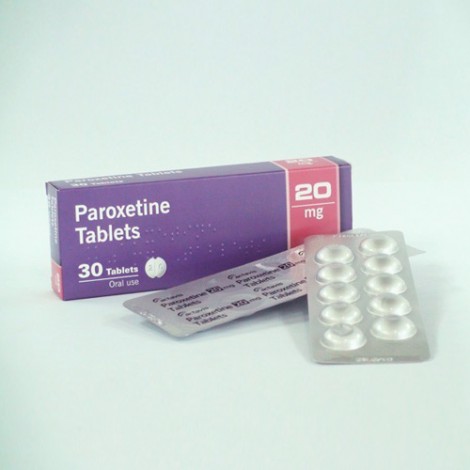Paxil Information
Paxil, also known under the names of Paroxetine, Seroxat or Aropax, is a medicine that belongs in the serotonin reuptake inhibitors class of drugs. It acts by balancing the chemicals in the human brain, preventing and helping remove such conditions as depression, anxiety or obsessive-compulsive behavior. It can be found under the form of tablets or suspension.
Paxil Indications
Paxil is mainly prescribed for the treatment of such disorders as depression, panic disorder, general anxiety, obsessive-compulsive disorder, social anxiety or phobia and Post Traumatic Stress Disorder (PTSD). Paxil can also be prescribed to treat a number of other conditions, so it is best that you ask your personal health care specialist if you want to know more about this drug and why it was prescribed to you.
Paxil Warnings
You should avoid taking Paxil if you have taken Monoamine Oxidase Inhibitor (MAOI) anywhere in the last two weeks, or if you were exposed to thioridazine (Mellaril) anytime over the past 6 weeks, as the consequences may be fatal. Consult with your personal health care specialist before starting Paxil treatment and make sure he is aware of your entire medical history. Special care and dosage will be employed if you are or have been suffering of:
- Kidney disease
- Liver disorders
- Seizures or Epilepsy
- Manic disorder
- Suicidal tendencies
Studies have not yet firmly established whether Paxil is safe to take during pregnancy. If you are pregnant or planning to become so soon, you should check with your personal physician to see if you can start a treatment with this drug. You should also consult your personal health care specialist if you are a nursing mother, as the active ingredients in this medicine are known to pass into breast milk and may harm the infant.
Paxil may cause dizziness and drowsiness in some cases, so it is recommended that you avoid performing operation that require prolonged concentration, such as driving or operating heavy machinery.
Paxil Intake Guidelines
Your personal health care specialist should provide you with a detailed list of instructions regarding Paxil intake. It is strongly advised that you never deviate from these guidelines. If you have trouble understanding any of the directions, please ask your doctor, a pharmacist or a nurse to better explain them to you. The pills should be taken whole, not crushed or broken, and accompanied by a glass of water. If you are taking Paxil (Paroxetine, Seroxat or Aropax) in suspension, it is recommended that you shake the suspension well before pouring a dose of the drug. Do not cease to take this medicine abruptly, as there may be unwanted consequences. Instead, talk to your personal health care specialist and set up a cessation plan, to avoid unwanted effects.
Paxil Dosage
Please your personal physician to prescribe the Paxil dosage best suited for your age and general medical condition. Do not attempt to self-medicate, as this may result in grave, possibly even lethal consequences. Do not use the dosage prescribed to another patient, as the doses can vary greatly from one medical case to another.
Paxil Overdose
Among the symptoms of Paxil overdose, the most common are nausea, vomiting, tremors, seizures, agitation, drowsiness, hyperactivity, enlarged pupils. If you have any of these symptoms or have reason to believe you are suffering from an overdose with this drug, please contact at once your personal health care specialist or go to the nearest hospital to seek emergency medical attention.
Paxil Missed Dose
You should maintain a strict intake schedule, so as to avoid missing a dose of Paxil. However, should you happen to miss a dose, take it as soon as you remember, unless it is almost time for another intake, case in which it is recommended that you entirely skip that dose and continue with your regular intake program. Under no circumstances should you take a double dose of Paxil to make up for the lost one, as the consequences may be severely hazardous to your health.
Paxil Side Effects
There are some side effects associated with usage of Paxil. Some of the most frequent ones are:
- Allergic reactions
- Irregular pulse and heart beats
- Low blood pressure, with dizziness and weakness
- High blood pressure, with severe headaches and blurred vision
- Fever
- Headaches
- Tremors, nervousness and anxiety
- Sleepiness
- Insomnia
- Dryness of the mouth
- Decrease in the sexual drive
- Chills
There are other side effects that may appear while taking Paxil (Paroxetine, Seroxat or Aropax). If you start experience unusual symptoms, or they become too bothersome, please consult your personal health care specialist immediately to investigate and establish the causes, and determine the appropriate course of action.
Paxil Drug Reactions
It is strongly advised that Paxil should not be taken if you have been taking Monoamine Oxidase Inhibitor (MAOI) anywhere within the last two weeks, as the consequences of this action can be lethal. You should also avoid taking this medicine if you have been exposed to thioridazine (Mellaril) anywhere in the past six weeks, as this can also result in death.
Tell your personal health care specialist if you are taking or have been taking any of the following drugs:
- Benzodiazepine
- Tricyclic anti-depressants
- Phenothiazine
- Almotriptan
- Frovatriptan
- Carbamezepine
- Lithium
- Digoxin
- Warfarin
- Cimetidine
If you are currently taking any of these drugs, or have recently finished treatment with any of them, your personal physician may decide that you should stop your Paxil treatment entirely or significantly alter your dosage, in order to maintain your health and safety.


